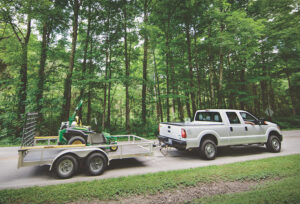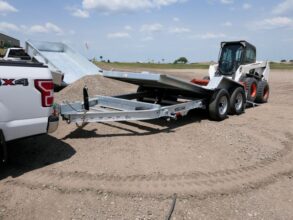How Do I Know If Alternative-fuel Mowers are Right for My Business?

By Jeremy Wishart
Many professional landscapers will remember the summer of 2018 for one thing: high gasoline prices. Unfortunately for everyone in the landscape industry, the Energy Information Administration is forecasting another year in 2019 with higher-than-normal fuel prices.
Even small fluctuations in gasoline prices for some contractors can mean the difference between a successful year and a year in the red, which can leave businesses looking for alternatives to fueling a fleet with gasoline.

Many contractors already know that propane costs less per gallon than gasoline, produces fewer emissions, and performs as well as or better than its gasoline counterparts. But it takes a period of high gasoline prices for some contractors to get serious about considering an alternative fuel such as propane. Once a contractor is at the point in which they’re ready to get serious about making the switch to an alternative-fuel mower fleet, they might have a few questions as to the impact the transition will have on their business — financial or otherwise.
Here are a few things for landscape contractors to consider when determining if a switch to propane is right for their business.
- Compare fuel costs.
The first thing a contractor can do to determine if propane might be a fit for their fleet is to compare fuel prices. Alternative fuels such as propane cost less than gasoline, but a contractor should do the research for their own business to determine exactly what they would save.
Contractors will typically save 30 to 50 percent per gallon just by using propane mowers compared to gasoline, and they often can lock in a propane price for a year or more with a local propane supplier. This not only keeps contractors from having to worry about fuel price increases, but it helps with budgeting, too.
To help with the fuel comparisons, the Propane Education & Research has a Propane Mower Calculator that can take a contractor’s current number of gasoline or diesel mowers, and show how much they would pay if that equipment used propane instead.
- Determine the costs to convert.
Switching to propane equipment doesn’t have to require additional costs up front, either. There are a variety of local and national incentives available to assist with the price differential between a propane mower model and its gasoline equivalent. Even if new equipment purchases aren’t in a contractor’s budget for 2019, propane conversion kits can provide a cost-effective way for a contractor to start seeing the benefits of the alternative fuel with existing mowers, too.
The Propane Mower Incentive Program from PERC, for example, offers $1,000 per qualifying mower purchase or $500 per qualifying conversion. The PMIP has an online application to make the submission process simple whenever a mower purchase is made.
The companies that offer EPA-certified kits also offer conversion training and technical assistance throughout the process and afterward to ensure success.
Depending on where the contractor is located, there may be other local incentives or grants available from Clean Cities organizations or state environmental agencies. Contractors should also check with OEMs for rebates and offers, too.
- Consider if propane will increase your prospective customers.
 Contractors often report gaining new customers as a result of operating propane mower fleets. Municipalities, school districts, and other public agencies are increasingly requiring bid applicants to offer sustainable services or reduced emissions. Propane mowers reduce greenhouse gas, nitrous oxide (NOx), and sulfur oxide (SOx) emissions compared to gasoline. Propane mowers also meet and exceed emissions standards in communities with “ozone action days,” so equipment and crews are never sidelined on busy days when gasoline mowers aren’t allowed to run.
Contractors often report gaining new customers as a result of operating propane mower fleets. Municipalities, school districts, and other public agencies are increasingly requiring bid applicants to offer sustainable services or reduced emissions. Propane mowers reduce greenhouse gas, nitrous oxide (NOx), and sulfur oxide (SOx) emissions compared to gasoline. Propane mowers also meet and exceed emissions standards in communities with “ozone action days,” so equipment and crews are never sidelined on busy days when gasoline mowers aren’t allowed to run.
Homeowners, too, are becoming more likely to put their dollars toward services that reduce emissions or benefit the environment. To reach this market, contractors can point out that propane is designated by the EPA as a non-contaminant of air, water, and soil, and won’t leave any spills or residue that could harm children or pets.
As alternative fuels continue to grow in popularity, so will opportunities for contractors. With this guide, contractors can have a solid strategy to determine if switching to an alternative fuel such as propane is right for their business in 2019. More about propane mowers can be found at propane.com/commercial-landscape.
Jeremy Wishart is the director of off-road business development for the Propane Education & Research Council. He can be contacted at jeremy.wishart@propane.com.


